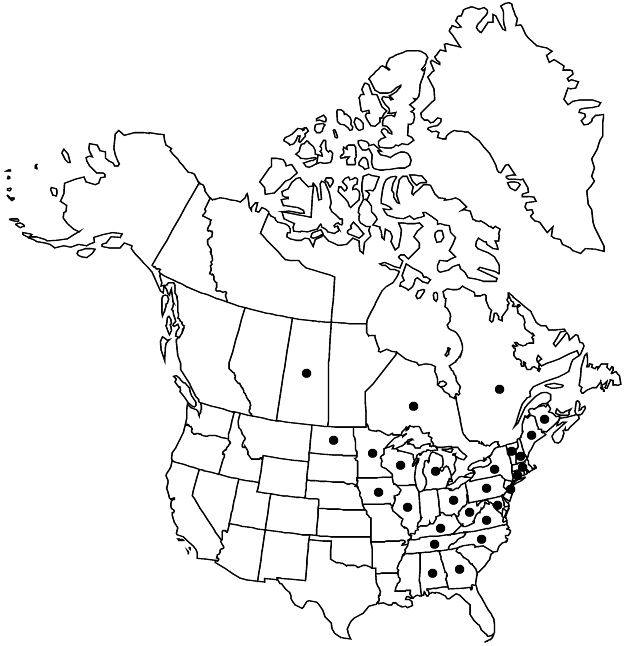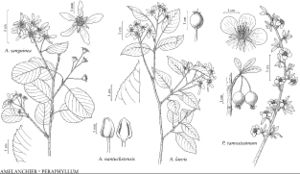Difference between revisions of "Amelanchier sanguinea"
in A. P. de Candolle and A. L. P. P. de Candolle, Prodr. 2: 633. 1825.
FNA>Volume Importer |
imported>Volume Importer |
||
| (6 intermediate revisions by 2 users not shown) | |||
| Line 1: | Line 1: | ||
{{Treatment/ID | {{Treatment/ID | ||
|accepted_name=Amelanchier sanguinea | |accepted_name=Amelanchier sanguinea | ||
| − | |accepted_authority=(Pursh) | + | |accepted_authority=(Pursh) de Candolle |
|publications={{Treatment/Publication | |publications={{Treatment/Publication | ||
|title=in A. P. de Candolle and A. L. P. P. de Candolle, Prodr. | |title=in A. P. de Candolle and A. L. P. P. de Candolle, Prodr. | ||
| Line 13: | Line 13: | ||
}}{{Treatment/ID/Special_status | }}{{Treatment/ID/Special_status | ||
|code=F | |code=F | ||
| − | |label= | + | |label=Illustrated |
}} | }} | ||
| − | |basionyms={{Treatment/ID/ | + | |basionyms={{Treatment/ID/Basionym |
|name=Pyrus sanguinea | |name=Pyrus sanguinea | ||
|authority=Pursh | |authority=Pursh | ||
| + | |rank=species | ||
| + | |publication_title=Fl. Amer. Sept. | ||
| + | |publication_place=1: 340. 1813 | ||
}} | }} | ||
|synonyms={{Treatment/ID/Synonym | |synonyms={{Treatment/ID/Synonym | ||
|name=Amelanchier huronensis | |name=Amelanchier huronensis | ||
|authority=Wiegand | |authority=Wiegand | ||
| + | |rank=species | ||
}} | }} | ||
|hierarchy=Rosaceae;Rosaceae subfam. Amygdaloideae;Rosaceae tribe Gillenieae;Amelanchier;Amelanchier sanguinea | |hierarchy=Rosaceae;Rosaceae subfam. Amygdaloideae;Rosaceae tribe Gillenieae;Amelanchier;Amelanchier sanguinea | ||
| Line 37: | Line 41: | ||
|elevation=0–1000 m | |elevation=0–1000 m | ||
|distribution=N.B.;Ont.;Que.;Sask.;Ala.;Conn.;Ga.;Ill.;Iowa;Ky.;Maine;Md.;Mass.;Mich.;Minn.;N.H.;N.J.;N.Y.;N.C.;N.Dak.;Ohio;Pa.;Tenn.;Vt.;Va.;W.Va.;Wis. | |distribution=N.B.;Ont.;Que.;Sask.;Ala.;Conn.;Ga.;Ill.;Iowa;Ky.;Maine;Md.;Mass.;Mich.;Minn.;N.H.;N.J.;N.Y.;N.C.;N.Dak.;Ohio;Pa.;Tenn.;Vt.;Va.;W.Va.;Wis. | ||
| − | |discussion=<p>This treatment follows G. N. Jones’s (1946) and E. G. Voss’s (1972–1996, vol. 2) with the inclusion of Amelanchier huronensis in A. sanguinea. The former was considered to differ from A. sanguinea in having longer proximalmost pedicels, sepals, and petals, but overlap occurs in the ranges of these characters. Moreover, A. sanguinea has been seen far from the range of A. huronensis (southern Ontario, Michigan, Minnesota, and Wisconsin) with petals as long as the longest reported for A. huronensis. Occurrences of A. sanguinea in Kentucky and North Dakota are questionable, as no specimens were actually seen to confirm the presence of this species from these states.</p><!-- | + | |discussion=<p>This treatment follows G. N. Jones’s (1946) and E. G. Voss’s (1972–1996, vol. 2) with the inclusion of <i>Amelanchier</i> huronensis in <i>A. sanguinea</i>. The former was considered to differ from <i>A. sanguinea</i> in having longer proximalmost pedicels, sepals, and petals, but overlap occurs in the ranges of these characters. Moreover, <i>A. sanguinea</i> has been seen far from the range of A. huronensis (southern Ontario, Michigan, Minnesota, and Wisconsin) with petals as long as the longest reported for A. huronensis. Occurrences of <i>A. sanguinea</i> in Kentucky and North Dakota are questionable, as no specimens were actually seen to confirm the presence of this species from these states.</p><!-- |
| − | --><p>Amelanchier sanguinea has shorter petals than A. amabilis. Amelanchier humilis differs from A. amabilis and A. sanguinea in having shorter proximalmost pedicels, erect inflorescences, and shorter petals. Amelanchier amabilis, A. sanguinea, and, to a lesser extent, A. humilis resemble western North American congeners.</p><!-- | + | --><p><i>Amelanchier sanguinea</i> has shorter petals than <i>A. amabilis</i>. <i>Amelanchier humilis</i> differs from <i>A. amabilis</i> and <i>A. sanguinea</i> in having shorter proximalmost pedicels, erect inflorescences, and shorter petals. <i>Amelanchier amabilis</i>, <i>A. sanguinea</i>, and, to a lesser extent, <i>A. humilis</i> resemble western North American congeners.</p><!-- |
| − | --><p>Amelanchier sanguinea flowers 10 to 14 days after A. arborea and A. laevis, according to K. M. Wiegand (1912), and at the same time as A. amabilis. Hybrids between A. sanguinea and A. bartramiana, A. canadensis, A. laevis, and A. spicata have been reported (M. L. Fernald 1950; P. Landry 1975). The authors have observed A. sanguinea flowering with A. amabilis but no putative hybrids were observed.</p> | + | --><p><i>Amelanchier sanguinea</i> flowers 10 to 14 days after <i>A. arborea</i> and <i>A. laevis</i>, according to K. M. Wiegand (1912), and at the same time as <i>A. amabilis</i>. Hybrids between <i>A. sanguinea</i> and <i>A. bartramiana</i>, <i>A. canadensis</i>, <i>A. laevis</i>, and <i>A. spicata</i> have been reported (M. L. Fernald 1950; P. Landry 1975). The authors have observed <i>A. sanguinea</i> flowering with <i>A. amabilis</i> but no putative hybrids were observed.</p> |
|tables= | |tables= | ||
|references= | |references= | ||
| Line 48: | Line 52: | ||
-->{{#Taxon: | -->{{#Taxon: | ||
name=Amelanchier sanguinea | name=Amelanchier sanguinea | ||
| − | + | |authority=(Pursh) de Candolle | |
| − | |authority=(Pursh) | ||
|rank=species | |rank=species | ||
|parent rank=genus | |parent rank=genus | ||
| Line 62: | Line 65: | ||
|publication title=in A. P. de Candolle and A. L. P. P. de Candolle, Prodr. | |publication title=in A. P. de Candolle and A. L. P. P. de Candolle, Prodr. | ||
|publication year=1825 | |publication year=1825 | ||
| − | |special status=Endemic; | + | |special status=Endemic;Illustrated |
| − | |source xml=https:// | + | |source xml=https://bitbucket.org/aafc-mbb/fna-data-curation/src/2e0870ddd59836b60bcf96646a41e87ea5a5943a/coarse_grained_fna_xml/V9/V9_1122.xml |
|subfamily=Rosaceae subfam. Amygdaloideae | |subfamily=Rosaceae subfam. Amygdaloideae | ||
|tribe=Rosaceae tribe Gillenieae | |tribe=Rosaceae tribe Gillenieae | ||
Latest revision as of 22:54, 5 November 2020
Shrubs or small trees, 1–7 m. Stems 1–20, ± colonial. Leaves fully unfolded or nearly so; petiole (8–)11.3–18.1(–25) mm; blade elliptic-oblong to suborbiculate or obovate, (27–)38–59(–78) × (19–)26–43(–55) mm, base rounded to subcordate, each margin with (0–)4–11(–16) teeth on proximal 1/2 and (0–)3–6(–8) teeth in distalmost cm, largest teeth more than 1 mm, apex rounded and mucronate to subacute, abaxial surface densely (sparsely) hairy by flowering, surfaces sparsely (moderately) hairy (or glabrous) later. Inflorescences (4–)7–10(–13)-flowered, (20–)30–51(–68) mm. Pedicels: 0–2 subtended by a leaf, proximalmost (8–)11–23(–36) mm. Flowers: sepals recurved or spreading after flowering, (1.8–)2.5–4.1(–6) mm; petals linear to narrowly spatulate, (8–)10.7–16.1(–20) × (2–)3.5–5.6(–7) mm; stamens (16–)19–21(–24); styles (4 or)5, (1.6–)2.5–3.4(–4.6) mm; ovary apex densely (moderately) hairy. Pomes dark purple or almost black, 10 mm diam. 2n = 2x, 3x, 4x.
Phenology: Flowering May–Jun; fruiting Jul–Aug.
Habitat: Margins of woods, river ledges, shorelines, rocky slopes, crevices of open rock faces and cliffs, noncalcareous to slightly calcareous sites
Elevation: 0–1000 m
Distribution

N.B., Ont., Que., Sask., Ala., Conn., Ga., Ill., Iowa, Ky., Maine, Md., Mass., Mich., Minn., N.H., N.J., N.Y., N.C., N.Dak., Ohio, Pa., Tenn., Vt., Va., W.Va., Wis.
Discussion
This treatment follows G. N. Jones’s (1946) and E. G. Voss’s (1972–1996, vol. 2) with the inclusion of Amelanchier huronensis in A. sanguinea. The former was considered to differ from A. sanguinea in having longer proximalmost pedicels, sepals, and petals, but overlap occurs in the ranges of these characters. Moreover, A. sanguinea has been seen far from the range of A. huronensis (southern Ontario, Michigan, Minnesota, and Wisconsin) with petals as long as the longest reported for A. huronensis. Occurrences of A. sanguinea in Kentucky and North Dakota are questionable, as no specimens were actually seen to confirm the presence of this species from these states.
Amelanchier sanguinea has shorter petals than A. amabilis. Amelanchier humilis differs from A. amabilis and A. sanguinea in having shorter proximalmost pedicels, erect inflorescences, and shorter petals. Amelanchier amabilis, A. sanguinea, and, to a lesser extent, A. humilis resemble western North American congeners.
Amelanchier sanguinea flowers 10 to 14 days after A. arborea and A. laevis, according to K. M. Wiegand (1912), and at the same time as A. amabilis. Hybrids between A. sanguinea and A. bartramiana, A. canadensis, A. laevis, and A. spicata have been reported (M. L. Fernald 1950; P. Landry 1975). The authors have observed A. sanguinea flowering with A. amabilis but no putative hybrids were observed.
Selected References
None.
